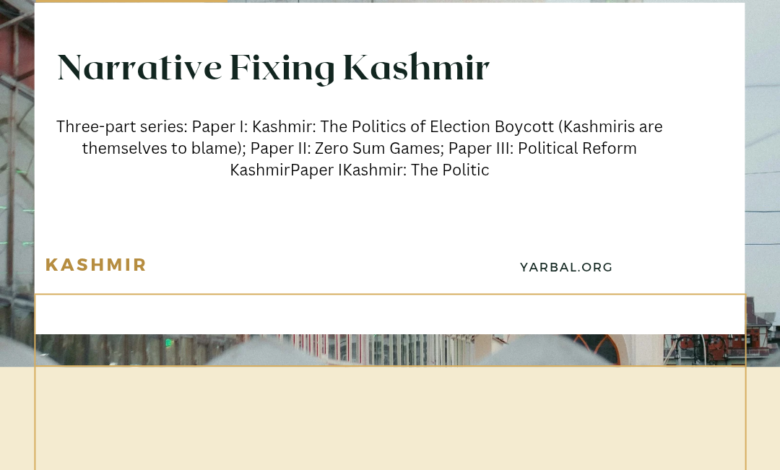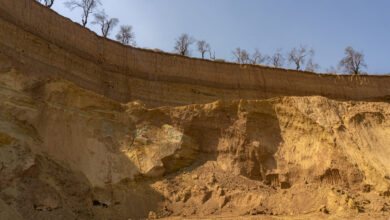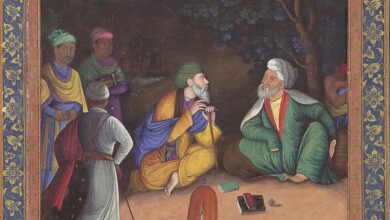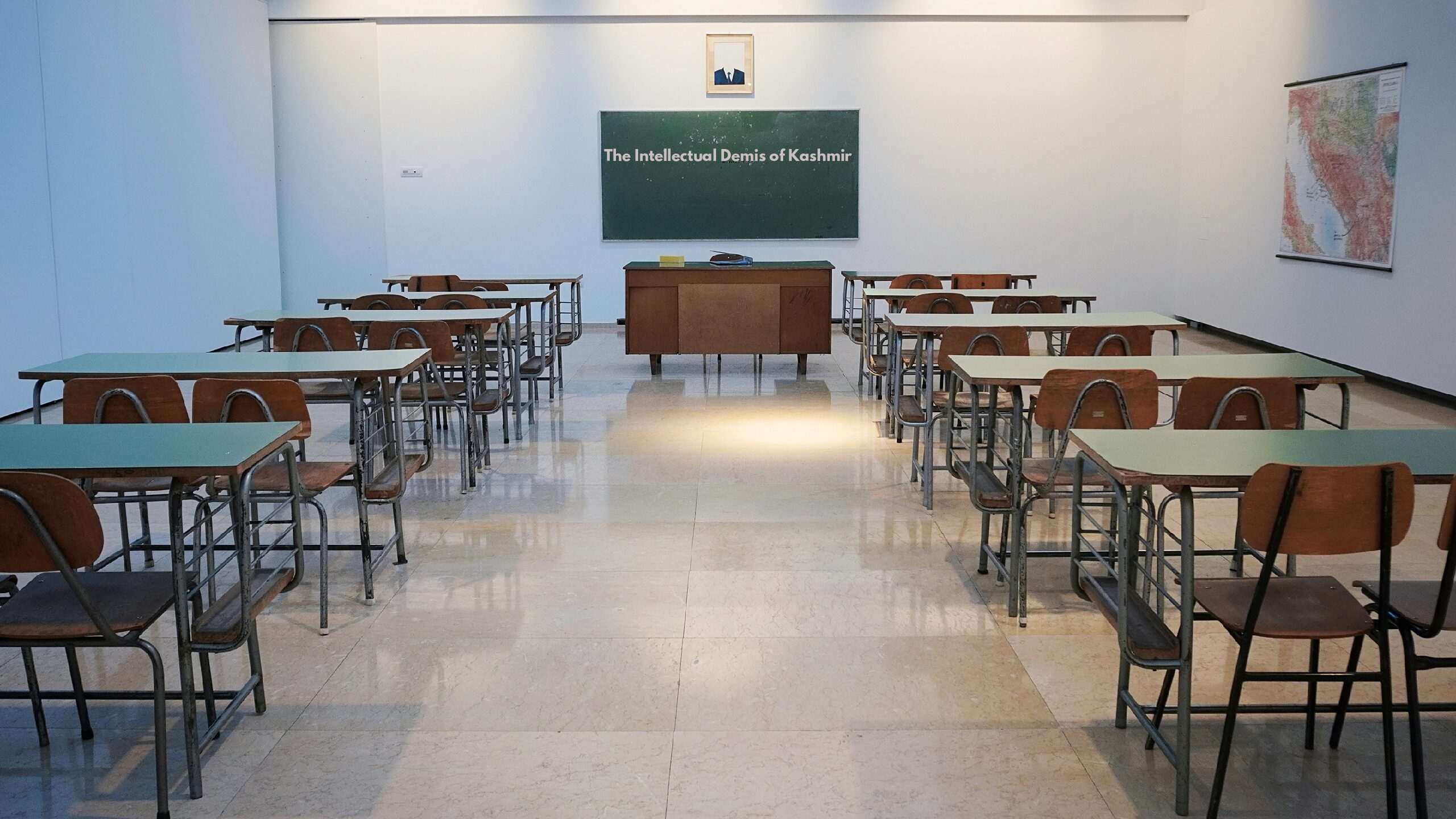
Three-part series: Paper I: Kashmir: The Politics of Election Boycott (Kashmiris are themselves to blame); Paper II: Zero Sum Games; Paper III: Political Reform KashmirPaper IKashmir: The Politic
Kashmir: The Politics of Election Boycott ( Paper 1)
Right up to his death, S. A. Geelani of Jammati-Islami (JI) remained adamant on boycotting elections on the ground that he did not subscribe to the Constitution of India that described J&K as territory of India. This ensured a walkover to the “mainstream” politicians during elections. Coupled with frequent hartal and Chalo-protest-march, it brought about political stagnation in Kashmir. Consequently, by 2019, the year when Article 370 was derogated, Kashmiris were already politically dead. The people of Kashmir failed to learn any lessons from the election boycott stints imposed upon them by Sheikh Mohammad Abdullah during the 1960s on the basis of a similar argument – (although, unlike S.A. Geelani in the 1990s, he knew that there was tremendous potential in Article 370 that defined Jammu & Kashmir (J&K) State’s constitutional relationship with India). JI revolved around the thought and personage of Moulana Syed Abul Aala Maudoodi. The latter was at loggerheads with the military junta of Pakistan. Pakistan military funded the Plebiscite Front Movement launched in 1955 by Afzal Beg that was conducted by a faction of former National Conference (NC) partisans under the patronage of Sheikh Mohammad Abdullah. The latter did not believe in the notion of plebiscite. He had opposed it when in power. Sheikh Mohammad Abdullah thought that New Delhi administration had wronged him by dismissing him on August 09, 1953, from the Prime Ministership of J&K. He believed India owed its existence in Kashmir to him. On the contrary, New Delhi administration thought that Sheikh Mohammad Abdullah owed his existence as Prime Minister to them. And that by falling foul, in 1952, of the policy of gradual merger of J&K with the Union of India as spelt out in Article 370 he had forfeited his right to be PM. It was a clash between Indian State interest on the one hand and Sheikh Mohammad Abdullah’s personalism on the other. People of J&K did not count.
Pakistan Government lost no time to fish in these troubled waters. They adopted Sheikh Mohammad Abdullah as their own boy. He talked plebiscite. Boycotted elections. Pakistan Government felt justified to create turbulence inside Kashmir on the ground that India had captured it through foul play. On the contrary, India claimed that they had done a favour to Kashmir by saving it from tribal raiders who had been sent by Pakistan government to destroy it. Therefore, they had a superior claim on Kashmir. Pakistan government’s tragic fault was that they allowed on October 22, 1947, through their territory, the invasion of Kashmir by communally surcharged tribesmen. This offered a much sought after chance to the Maharaja of J&K State to seek India’s intervention to save Kashmir from the depredations of the tribesmen which they indulged in Muzaffarabad border town. The Pandit Nehru-led government was waiting for this opportunity to come its way – Pandit Jawaharlal Nehru knew in September itself that the tribesmen would attack Kashmir ending October or early November (pp. 45-47 Sardar Patel’s Correspondence Vol. I Ed. Durga Das).
While as the Plebiscite Front (PF) party bosses were the blue eyed boys of Pakistan military, the Jammati-Islami (JI) cadres, for their ideological affinity with Moulana Syed Maudoodi, were out of favour. So, there was no love lost between JI and PF. PF projected Moulana Syed Maudoodi as anti-Pakistan –the Moulana had in the 1940s opposed M. A. Jinnah’s Pakistan movement, and was in the 1960s opposed to President Field Marshal Ayub Khan – that Sheikh Mohammad Abdullah had also opposed the Pakistan movement, had gone in person to Delhi on October 25, 1947, to invite Indian Army’s intervention in Kashmir, and (along with Sardar Patel) helped Pandit Jawaharlal Nehru in June 1949 to banish the Maharaja from the State lest he might formally appoint UNnominated Chester Nimitz as Plebiscite Administrator (pp. 261-63 Sardar Patel’s Correspondence Vol. I Ed. Durga Das; p.526 Aatashi-Chinar Sheikh Mohammad Abdullah & Mohammad Yusuf Teng), was inconsequential in the 1960s because he was now Pakistan’s own boy – the Maharaja of J&K wanted zonal plebiscites in order to save his native Jammu from going into Pakistan’s lap through a unitary majoritarian plebiscite. PF demagogues started their politicking with the recital of verses of The Quran and with Allama Iqbal’s poetry. So did the JI politicians. JI did not take part in the 1965-anti-Congress social boycott movement launched by Sheikh Mohammad Abdullah and vigorously implemented by bakts.
Yet the Sadiq Government of J&K often put JI party bosses into jails because it did not trust anyone in Kashmir because Pakistan, a small country, fought in its Western wing in 1965 a stalemated war with India, a very large country. So, the Srinagar and Delhi administrations were not confident of their position and strength in J&K. But when India thrashed Pakistan in 1971 in its Eastern wing, the Government thought that they had finally crushed Pakistan beyond resurgence.
Meantime, in December 1971 Syed Mir Qasim replaced G. M. Wani Sadiq as Chief Minister. Congress Government, both at provincial and central levels, was now confident of its position in J&K. So, it was time to use theenemy’s adversary. Hence, Congress Party’s decision to take JI for a ride (pp.335-37 Dastani-Hayat Syed Mir Qasim & Abdul Rehman Kondoo). JI was granted 5 seats in the 1972-provincial Assembly elections. This lent a sort of legitimacy to an admittedly rigged process. They strutted into the Assembly. Legislative autonomy of the State continued to be eroded through five Constitution Amendment Orders. So, the PF accused the JI men of being Congress agents. PF and Sheikh Mohammad Abdullah came out in their true colours in 1975 when they entered into a Faustian bargain with the New Delhi administration. They dumped the Plebiscite slogan. Strode into the corridors of power. Described the Plebiscite Movement as a sorry phase of political awaragardi (vagrancy, vagabondism). Abolished the PF. Re-established the NC that had been dissolved in 1965 by Chief Minister G. M. Sadiq. Despite the new NC’s Autonomy rhetoric, they also sponsored seven Constitution Amendment Orders thereby further eroding the legislative autonomy of J&K State. NC was a power political party. So was JI. So was Congress. When Congress was down in 1977, JI offered a poll alliance to NC which the latter spurned (p.209 Wular Kinare Vol. II S. A. Geelani). In 1983 JI requested Moulvi Farooq for alliance. The Moulvi preferred to ally with NC. Ending 1986, NC and Congress formed a coalition government. In reaction the religious parties of Kashmir combined into Muslim United Front (MUF). MUF was dominated by JI – JI people must have felt aggrieved against Congress-led New Delhi administration for again and again allying with NC (former PF) although they (JI) had been better guys than the plebiscite-wallas, and, therefore, deserved better!
The coalition government rigged March 1987 elections, and persecuted the party bosses and workers of MUF. Previously also, the elections had been shamelessly rigged. Not much could the Kashmiris do then. But by 1987, they had come under the influence of Afghan Jihad and Khalistan Movement –other triggers were of course the historical Kashmir Issue and the arbitrary 1984- and 1986-dismissals of provincial governments by Governor Jagmohan. Result: Armed revolt against India. The pioneer organisation of the armed revolt was the ostensibly secular and nationalist Jammu Kashmir Liberation Front (JKLF). They gave a call to boycott 1989-Indian general elections. People heeded to their call. Soon the Islamist Hizbul Mujahideen, that projected itself to be an armed wing of JI, sidelined the JKLF. JKLF was mostly urban. Hizb had a rural base. S. A. Geelani became the patron of Hizb the way Sheikh Mohammad Abdullah had become patron of PF. In the 1950s PF had not pioneered the plebiscite movement. That job was done in June 1953 by Political Conference of G. M. Qarra when SheikhMohammad Abdullah was still Prime Minister and opposed to plebiscite theme – G. M. Qarra demanded plebiscite in 1953 because he was indignant against Prime Minister Sheikh Mohammad Abdullah for having denied him a prominent position in the J&K government – (in 1977 G. M. Qarra incepted Janata Party in J&K – Pakistan has always played its Great Game in Kashmir through lining the pockets of turncoats like G. M. Qarra and Sheikh Mohammad Abdullah, etc. – and strangely, New Delhi administration also patronised the same turncoats). In 1988-89, when JKLF started the armed revolt, S. A. Geelani was still a member of the provincial Assembly. When his membership of the Assembly became untenable as he would be marked for assassination, he resigned under the pretext of election rigging that had taken place two and a half years earlier. Rather than retiring from politics, he staged a volte-face to become the patron of Hizb and plebiscite slogan. This made him relevant in the turbulent politics of Kashmir.
Patron S.A. Geelani had only nitric acid in store for Sheikh Mohammad Abdullah and party. He and his Jamati Islami had never actually forgotten the wounds inflicted upon them by NC. It so happened that on April 04, 1979, Z. A. Bhuttoo was executed in Pakistan. Jamati Islaim of J&K could not be connected with the execution through any stretch of imagination. Yet the ruling NC cadres attacked JI cadres in rural areas of Kashmir for a week. They were settling the scores of 1960s and 1970s when JI denied support to NC predecessor PF, and contested elections in 1972 over PF’s head. Also, NC cadres resented being described by JI as traitors. So, they thrashed JI men, destroyed their houses, cow sheds, and granaries, and felled down their fruit trees. Also they vandalized JI-controlled mosques and mosque schools, throwing in gutters copies of Tafhimul-Quran, commentary of The Quran written by Moulana Syed Maudoodi. In the 1950s, S. A. Geelani had spent about four years at ruling NC headquarters, Mujahid Manzil, Zainakadal, downtown Srinagar (p.141 Wular Kinare Vol. I S. A. Geelani). Mujahid Manzil was a den of Joseph Stalin’s followers. They had let loose a reign of terror on Muslims of J&K. They ruled on fascistic lines, arresting people, torturing them, not even sparing their radio sets lest they might tune in to Radio Pakistan. Post April 1952, upon Sheikh Mohammad Abdullah’s shifting to confrontation mode against New Delhi administration, the ruling NC shifted Naya Kashmir Red Terror against Hindus in Jammu. All these years young S. A. Geelani lived as a protégé of Moulana Syed Masoodi, NC General Secretary, who arranged for his further education at Mujahid Manzil.
The latter also got him appointed in the Education Department as Teacher, Primary School, Pathar Masjid, located near NCheadquarters (p. 151 Wular Kinare Vol. I S. A. Geelani). During his Teacher days, later on, he came under the influence of Jammati-Islami. When Moulana Masoodi, Sheikh Mohammad Abdullah, et al, conducted the Plebiscite Movement, JI walked the footsteps of Moulana Syed Maudoodi.
In the 1990s, Patron Geelani did not stop at calling Sheikh Mohammad Abdullah a traitor and demanding plebiscite. He went many steps further. He denounced elections. Described democracy (as also nationalism, secularism, socialism, communism, liberalism) as satanic. Said that azadi – (a vague term literally signifying “freedom” used by JKLF to mean “complete independence of the whole former J&K Princely State”, which they called ispar-uspar azadi, and to which purpose they sought intervention of the UN, an organisation that did not recognize this third option for J&K) – must be for the sake of Islam (azadi bara-ei Islam) which by extension was taken to mean that Kashmir must be part of Islamist Pakistan which in turn must be a Caliphate. For bringing this about, Muslims must do jihad.
Jihad, the most misunderstood and the most abused term in modern times, is a very wide term that literally signifies “to strive, to struggle”. In Islam it signifies a daily, individual, and collective, peaceful effort to protect and safeguard justice. Islam commands its followers never to support wrong, injustice. Siding with Right/Justice/Truth against Untruth/Injustice/Wrong is jihad. Controlling one’s own animal self, doing good and desisting from evil, is jihad. Jihad is not necessarily a military term. Islam forbids taking life. It preaches civilized debate (The Quran 29:46) rather than violence. Holds saving life as the act of highest merit (The Quran 5:32). The military term used in Islam is qital which means killing in the sense of war fighting (The Quran 2:190-191,216-217,244; 3:13; 4:74-77,84,89-91; 9:5,12-14,36,83,123; 22:39-40; 47:4,20; 48:16; 57:10; 61:4; 74:20). Qital is a lesser aspect of jihad and a state activity – (imagine a large circle and a small circle on the inside fringe of the larger one, the smaller circle would represent qital, the war-time-fighting state activity, and the larger one would represent jihad the daily peaceful activity). A Muslim would participate in qital, mostly defensive, on behalf of Al Madina (the City-State; madina means city) in a time when there used to be no standing army for the defence of the State and every able-bodied Muslim was a potential soldier of the State who was required to keep weapons for its (Islamic State’s) defence – the State where the Prophet (peace be upon him) had to complete his Message. We live in the time of nation states that have huge armies. Keeping weapons on behalf of and fighting for the nation state is their job, because they are paid for it. Now so far as the term Jihadi-Akbar, Greater Jihad, is concerned, it is by no means a military term because the verse enshrining the concept of JihadanKabira, i.e., placing Quranic teachings before the non-believers, is a Meccan revelation (The Quran 25:52) when the nascent Muslim community was not constituted into a State. The Prophet (peace be upon him) created the Madinan State later on at Yethrib /pr. yesrib/ after he (peace be upon him) migrated from Mecca to that place. In Kashmir in the 1990s a premium was put on violence. Assassinations came to be considered acts of high merit.
By and by, when weapons landed into unworthy hands, this phenomenon gave birth to another phenomenon called na-maloom bandukbardar – unidentified gunmen. This phenomenon is one of the reasons why Kashmiris desisted from questioning demagogues –(the other is the presence of religion in politics). Violence, as was natural, begot violence (and conferment upon armed forces of special powers to kill) and thereby creating an uncontrollable cycle of violence resulting in chaos and confusion. This cycle of violence needed to be broken at some point of time –say when it was clear that the Kashmir Issue had got sufficiently highlighted. This could not be done. On the contrary hartali politics, chalo- protest-marchs and election boycott fortified the violence-based azadi revolt. Result: i) Political paralysis; ii) Rather than reaping sought-after political advantages, Jammu and Kashmir even lost in August 2019 its extant political rights just like had happened in 1965. Now an Islamist Pakistan Caliphate. Patron S. A. Geelani said that Pakistan was created for the sake of setting up Islamic rule.
I beg to differ. Pakistan was created as a Muslim homeland for those Muslims of British India who lived in contiguous districts with Muslim majorities. M.A. Jinnah envisaged this Muslim homeland to be a liberal democracy
(Azadi for What? 2016 Kashmir Reader – read here: https://www.kashmirchronicles.com/post/azadifor-what ).
Now a question could be asked: What was the harm if Pakistan (and Kashmir as part of it) were made a Caliphate? The answer is simple. Establishment of Caliphate is impossible because Islam does not prescribe any particular system of government (kingship, caliphate, amirate, democracy, theocracy) nor any procedure for appointing or replacing government. Whenever and wherever, efforts would be made to set up Islamist caliphate/emirate, the result would be civil war among rival claimants, sooner or later, especially at the time of succession. The Islamic concept of caliphate is simply that Human Personality is God’s deputy (caliph) on earth (The Quran 02:30). This concept has nothing to do with the government of any state. And so far as the inception of Caliphate in the sense of government of Al Madina State after the demise of the Prophet (peace be upon him) was concerned, it was a marvellous innovation initiated by His Companions (peace be upon them) which ensured unity of the Ummah (community of Muslims), continuity of Al Madina city-state and smooth transfer of state authority (pp. 35-36 Destiny Disrupted Tamim Ansari). However, since no political succession law (government appointing and replacing procedure) was promulgated, civil war took hold of Caliphate in the time of third and fourth Caliphs (peace be upon them). Talk of establishment of Caliphate in modern times is a ruse to befool Muslims. Patron S. A. Geelani did not deem it necessary to enlighten the people about lack of political succession law in Islam. Instead he indulged in Islamist, caliphatist, maximalist, rejectionist, and boycott-ist rhetoric – (allegedly JI supporters, in the hatred of NC, secretly advised south Kashmiris to vote for Mufti Sayeed’s Peoples’ Democratic Party (PDP)!). Boycotting elections ensured provincial Bharatiya Janata Party (BJP)’s coming into power in J&K in March 2015 (as a coalition partner with PDP) the way Sheikh Mohammad Abdullah’s rejectionism paved the way for provincial Congress (established 1965 by G. M. Sadiq and Syed Mir Qasim) to become the ruling party. Sheikh Sahib and Geelani Sahib (as they were popularly known) were similar stuff.
When it suited them they boycotted elections (and demanded plebiscite) and when it suited them they participated. Muslims of Kashmir Valley hero-worshipped them. Resultantly, J&K progressively lost its semiindependent autonomous status (and the prospect of a plebiscite) which it enjoyed in 1949, the year of UN’s Plebiscite Resolution on J&K and of the promulgation of the Constitution of India, and, is now a mere Union Territory. Now JKLF armed revolt: It failed to remain a pure armed rebellion. In order to mobilize Muslim majority’s support, it was mixed up with Islamist slogans like “Azadi ka matlab kya, La ilaha illalah; Yehan kya challega, NizamiMustafa; Aey zalimo aey kafiro, Kashmir hamara chhod do”. Mixing religion and politics benefits neither politics nor religion. The biggest casualty is the concept of accountability. One cannot ask questions to political demagogues – (Kashmir has never seen a leader) – because they project themselves as indispensable guardians of religion (who never allow second rung leaders to spring up). The sooner the better if Kashmiris give up hero-worship, personalism, dynasticism, jihadism, caliphatism, rejectionism, exclusivism, foreign money, foreign dictation, and above all election boycott; and instead adopt programmatic political party/parties to enter the provincial legislative Assembly. Assembly is a better platform than the Street because the latter symbolizes hollow rhetoric; the former signifies a place of debate. On the contrary, if Kashmir erupts once again, once again religion will be mixed up with politics, and once again some cult personality will be thrown up who will then fool Kashmiris in the name of Azadi and Islam.
In reaction New Delhi administration may: i) try to change Kashmir’s demography; and, ii) grant Statehood to Jammu division and further dismember and downgrade Kashmir Valley into Chief Commissioners’ provinces corresponding to old time divisions Kamraz, Maraz, Yamraz. Across the LoC/CFL, Pakistan is under pressure of China since 2015 to merge J&K State territory of Gilgit-Baltistan (GB) to remove its tag of disputed territory to secure China’s BRI/CPEC interests. This has confused Pakistan Government. They demand that India should restore Article 370 to its original form and cancel the 2019-merger of J&K with India. Yet they talk of merging GB with Pakistan. Likewise Kashmiris are confused. They don’t know what exactly they want: Geelani Hurriyat’s Pakistan Caliphate; JKLF’s Ispar-Uspar Azadi; Mirwaiz Hurriyat’s India-Pakistan Joint Control Mechanism; or Article 370-based privileged status within India. It is a messy situation thanks to demagogues and blind followers. God save J&K!



